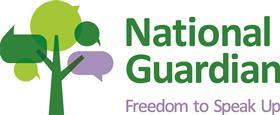Dr Jayne Chidgey-Clark explains why we all have a role to play in making speaking up business as usual for everyone
Will you speak up for safety, civility and inclusion?
Every year in October the National Guardian’s Office, together with Freedom to Speak Up guardians, leaders, managers and workers across the healthcare sector, celebrate Speak Up Month. It is an opportunity to have conversations within teams and organisations about what speaking up means and why it is important.
The theme for this year, our fifth Speak Up Month is “Freedom to Speak Up for Everyone” with each week having a specific focus – to Speak Up for safety, civility and inclusion.
The questions which stop people from speaking up are common to all settings and organisations. Is it safe to speak up? Will I be listened to? Will positive action be taken or will I be victimised or suffer detriment?
Sponsored by
Freedom to Speak Up is for everybody who works in healthcare. This includes people who work in primary and secondary care, independent providers, hospices and national bodies. The universal challenges and benefits which speaking up can bring are reflected in the new Freedom to Speak Up Policy for the NHS, and guidance for leaders which we have developed together with NHS England.
This refreshed range of Freedom to Speak Up materials for leaders in NHS organisations, and those providing NHS services, will help them develop and embed a supportive Speak Up, Listen Up, Follow Up culture.
The safety of people who use and work in our services is core to why Freedom to Speak Up was introduced and why it must be integral to how we operate. This is why for the first week of October we are focusing on how we can #SpeakUpForSafety.
Last year, of the over 20,000 cases raised with Freedom to Speak Up guardians, 19.1 per cent included an element of patient safety/quality. In response to concerns being raised during the pandemic, the National Guardian’s Office introduced a new reporting category of worker safety in 2021-22. Over the year, 13.7 per cent of cases had an element of worker safety.
The way we behave towards one another and work together has an impact on safety. We know that incivility in the workplace is a patient safety issue. 38 per cent of those who experience incivility say the quality of their work is reduced. And the impact is on the whole team – witnesses to workplace rudeness have a 20 per cent decrease in performance. So we should consider this both a behavioural and a patient safety matter – and there needs to be an organisational response to eliminate it.
The highest proportion of cases raised with Freedom to Speak Up guardians – over a third (32.3 per cent) – including an element of behaviours, such as bullying/harassment. This is why as part of Speak Up Month we are also focusing on #SpeakUpForCivility.
As Integrated Care Boards are becoming established it is essential that speaking up arrangements are consistent so all workers can be confident that when they speak up, they will be thanked, supported, listened to, and the appropriate actions taken
A wealth of research demonstrates the damage that discrimination and bullying does to workers’ health and wellbeing, and the impact it has on sickness, turnover, productivity, effective team working and patient care and safety.
With nearly one in 10 posts currently vacant, it is essential that this is addressed. We not only need to retain the valuable workers we have, but also make sure that the workplace is an attractive one for people considering healthcare as a profession and the healthcare professionals who are being encouraged to apply from overseas.
Inclusivity at the heart of Freedom to Speak Up, ensuring that everyone has a voice that counts, which is why we are asking people to #SpeakUpForInclusion. The NHS workforce is wonderfully diverse, with over 200 nationalities represented, made up of all ages, genders, sexualities and abilities.
Although Freedom to Speak Up is for everyone, we know that some people, including bank workers, students and those on short-term contracts, may face additional barriers to speaking up. Sir Robert Francis identified them as “vulnerable groups”: those who feel unable to speak up because they feel that to do so puts them at risk, whether due to their role, ethnicity or contract terms.
October is also the time for the NHS Staff Survey to be completed, and I am delighted that bank workers are finally being given the chance to have their voices heard.
As Integrated Care Boards are becoming established it is essential that speaking up arrangements are consistent so all workers can be confident that when they speak up, they will be thanked, supported, listened to, and the appropriate actions taken.
The pandemic has shown us why this is so vital. When the Care Quality Commission reviewed the use of “do not attempt cardiopulmonary resuscitation’ decisions during pandemic, they heard how workers felt unable to speak up or felt unsupported when they did, sometimes with devastating consequences.
That is why they recommended that health and social care providers must ensure that all workers understand how to speak up, feel confident to speak up and are supported and listened to when they do. We are working with the Department of Health and Social Care to see how the Freedom to Speak Up Guardian role can be made available for workers in social care alongside the rest of the healthcare sector.
Integration offers an opportunity to provide a supportive and consistent response when workers speak up about anything which has an impact on providing great care – whether that is safety, civility or inclusion.
We all have a role to play in making speaking up business as usual for everyone. I hope that as leaders across healthcare you will join me in showing your visible commitment, by taking part in “Wear Green Wednesdays” throughout October and supporting your Freedom to Speak Up Guardian in the work that they do.





























